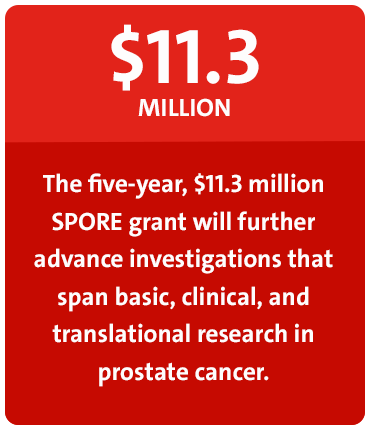Funding the Future of Cancer Care
Historic Gift for Cancer Care and Research
In November 2017, Columbia University and NewYork-Presbyterian announced that Florence Irving and her late husband, Herbert Irving, have given $700 million to the two institutions to dramatically advance research and clinical programs for the treatment of cancer. The Irvings’ historic gift will have a profound impact on research and clinical care.
The Irvings’ extraordinary philanthropy will be felt across a wide range of scientific disciplines, including cancer genomics, immunology, computational biology, pathology, and biomedical engineering. A key focus will be to further advance cancer research and clinical care in Columbia’s Precision Medicine Initiative, which, in partnership with NewYork-Presbyterian, is exploring the genetic and genomic basis of cancer and other life-altering diseases.
Physical Sciences Oncology Network Supports Innovative Research
The National Cancer Institute’s Physical Sciences in Oncology Network, comprised of 10 centers, funds research projects that bring together cancer biologists and oncologists with scientists from the fields of physics, mathematics, chemistry, and engineering to address some of the major questions and barriers in cancer research. Each center, among them Weill Cornell Medicine and Columbia University Medical Center, investigate complex and challenging questions in cancer research.
Researchers at Weill Cornell are interrogating the biological and physical mechanisms regulating tumor metabolism and function. Columbia researchers are undertaking projects in modeling tumor evolution.
New York State Department of Health Funds Clinical Researchers
In 2017, the New York State Department of Health granted $13.8 million through its Empire Clinical Research Investigator Program (ECRIP) to 26 academic medical institutions, including NewYork-Presbyterian/Columbia University Medical Center and NewYork-Presbyterian/Weill Cornell Medical Center, to train physician researchers. The two-year awards fund research teams focused on a specific topic and enhance the ability of hospitals to seek additional funding from the federal government to advance their work.
At NewYork-Presbyterian, the two projects funded by ECRIP are Optimization and Application of Precision Medicine Oncology in Cancer Care at Columbia, led by Dr. Gary K. Schwartz, and Improving Population Health Through Data Analytics: Identifying High Cost, High Need Patients Who Would Benefit from Care Coordination at Weill Cornell, led by Rainu Kaushal, MD, Chair, Healthcare Policy and Research, Weill Cornell Medicine.
Dream Team Stands Up 2 Colorectal Cancer
The Irvings’ historic gift will have a profound impact on research and clinical care at a time when new scientific tools and techniques are enabling researchers and clinicians to better understand how cancer begins and grows and how to fight its spread.
Weill Cornell Medicine and NewYork-Presbyterian have been named to the Stand Up 2 Cancer (SU2C) Colorectal Dream Team to drive new advances in colorectal cancer research and treatment. The interdisciplinary team, funded by a grant of up to $12 million, brings together researchers from four institutions who will focus on three complementary areas of research that have the potential to affect all stages of colorectal cancer, from premalignant lesion to patients diagnosed with metastatic disease. Dr. Lewis C. Cantley serves as co-leader of the SU2C Colorectal Dream Team.
Weill Cornell researchers will develop clinical trials in an effort to validate a 2015 discovery that a subset of colorectal cancers is sensitive to vitamin C therapy. About half of diagnosed cases of colorectal cancer each year harbor mutations in the KRAS and BRAF genes; these forms of the disease are more aggressive and do not respond well to current therapies. In a 2015 study, Weill Cornell researchers found in preclinical models that high doses of vitamin C impaired the growth of KRAS and BRAF mutant colorectal tumors. The SU2C grant will now enable the investigators to confirm their findings in human trials.
Prestigious SPORE Grant to Advance Prostate Cancer Research

Weill Cornell Medicine has been awarded a five-year, $11.3 million Specialized Programs of Research Excellence (SPORE) grant from the National Cancer Institute to improve the detection and treatment of aggressive prostate cancer (PCa). Established in 1992, SPORE grants serve as the cornerstone of the NCI’s efforts to promote collaborative, interdisciplinary translational cancer research.
This SPORE grant – the first ever awarded to Weill Cornell Medicine – will expand an already vibrant basic and translational research program in prostate cancer at Weill Cornell Medicine’s Sandra and Edward Meyer Cancer Center and Caryl and Israel Englander Institute for Precision Medicine (IPM). In addition, the grant provides yearly funding to support new high-risk and high-reward studies led by Weill Cornell Medicine researchers, as well as a career enhancement program for junior investigators who seek to enter into the field of prostate cancer research.

Dr. Himisha Beltran
The Weill Cornell Medicine SPORE grant has four major objectives:
-
Develop accurate biomarkers to assess the risk of PCa disease progression
-
Develop new therapeutic approaches for clinically localized and castrate-resistant prostate cancer that are hypothesis-driven, based on newly acquired knowledge of PCa biology and genomics, and represent a paradigm shift in treatment
-
Leverage existing and expand new infrastructure for the successful translation of preclinical studies into the clinic
-
Train the next generation of PCa investigators
Himisha Beltran, MD, Associate Professor of Medicine at Weill Cornell and Director of Clinical Activities, IPM, serves as a co-leader of this important research endeavor that supports four innovative research projects focused on highly translational areas relevant to the detection and treatment of aggressive prostate cancer. A basic scientist and translational clinical investigator will lead each of the following projects.
-
Non-Invasive Clinical Assay for Early Detection of Treatment Resistance in Patients with Metastatic Prostate Cancer
-
Targeting N-Myc and EZH2-Driven Castrate- Resistant Prostate Cancer
-
Toward Understanding Prostate Cancer Heterogeneity
-
Targeting Genomic Instability in Distinct Subclasses of Prostate Cancer


